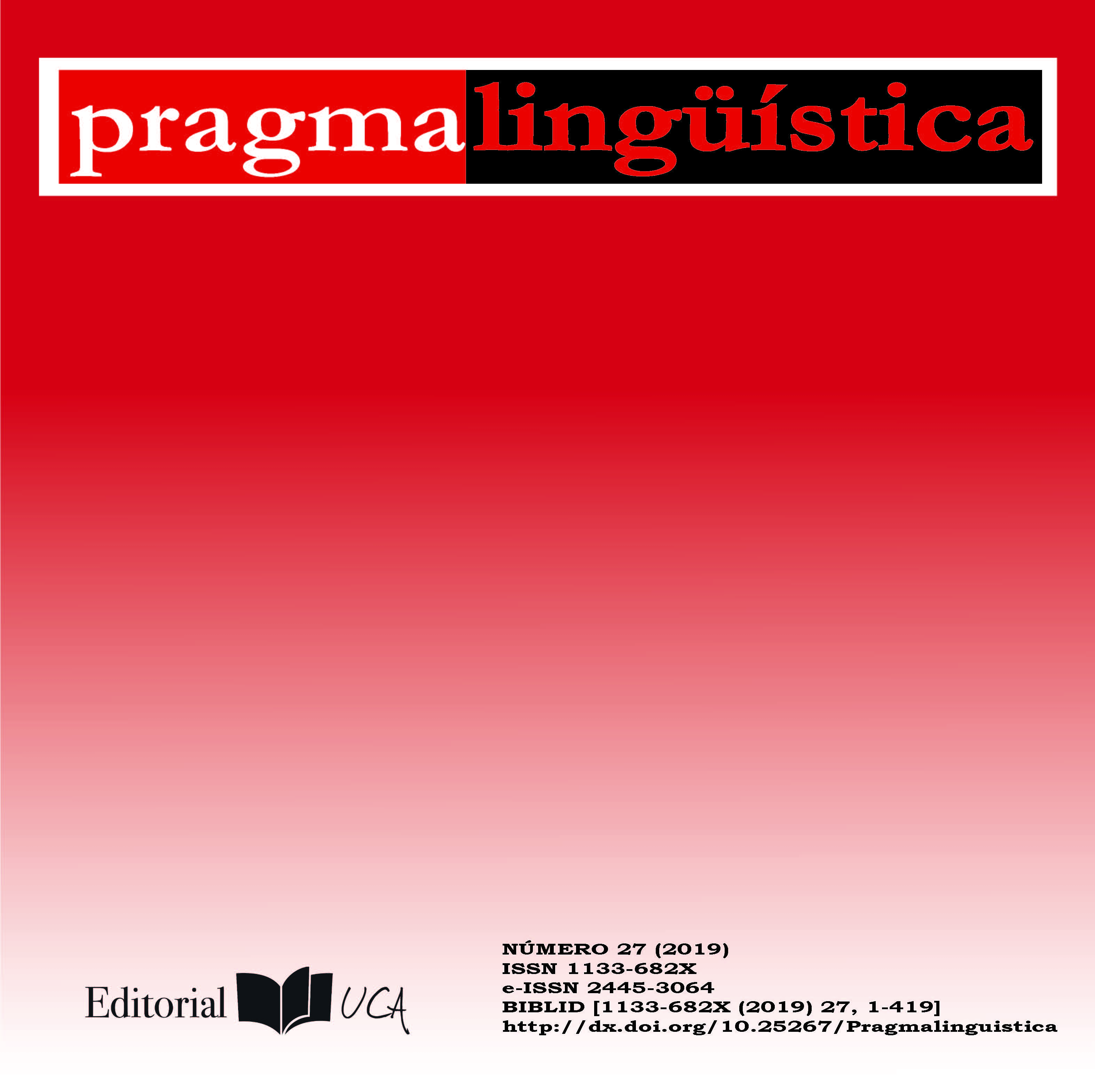Point of view and argumentative discursive structure in older adults

DOI
https://doi.org/10.25267/Pragmalinguistica.2019.i27.13Info
Abstract
The work argues that the choice of the point of view adopted by a speaker in an act of argumentative speech is psychosocially determined, a situation that also affects the discursive argument configuration. In order to specify part of the psychosocial characteristics of older adults in the sample, the Hample test was used (Pizarro and Rodríguez, 2013). In order to obtain a significant sample of texts that would allow establishing the recurrent argumentative structure in this type of speakers, Dilemma III of the D.I.T. Questionnaire was used (Rest, 2013). Cross-referencing of information between both instruments allowed establishing significant relationships between axiological frameworks, point of view and discursive semantic structure. In this way it is observed that older adults opt mostly for the opposite point of view, by means of a symptomatic scheme.
Keywords
Downloads
Supporting Agencies
How to Cite
License

This work is licensed under a Creative Commons Attribution-NonCommercial-NoDerivatives 4.0 International License.
References
ARISTÓTELES. (2006): Ética a Nicómaco, Buenos Aires: Gradifco.
BAYTELMAN, A. y DUCE, M. (2004): Manual de litigación en juicios orales, Santiago de Chile: Centro de Estudios de Justicia de Las Américas.
BEARDSLEY, M. (1950): Practical logic, New York: Prentice-Hall.
CAPOTE, M., FERNÁNDEZ, A. Y HERNÁNDEZ, P. (2007): “Moldes mentales en el proceso de aprendizaje”, Revista de orientación educativa, 39, pp. 31-46.
FIRBAS J. (1964): “On defining the theme in functional sentence analysis”, Travaux Linguistiques de Prague, 1, pp. 267-280.
FRONDIZI, R. (1972): ¿Qué son los valores?: una introducción a la axiología, México: Fondo de Cultura Económica.
GODDEN, D., & WALTON, D. (2007): “Advances in the Theory of Argumentation Schemes and Critical Questions”, Informal Logic, 27, pp. 267-292.
GRAESSER, A., SINGER, M., & TRABASSO, T. (1994): “Constructing inferences during narrative text Comprehension”, Psychological Review, 101, pp. 371-395.
HAMMER, L. Y NOEMI, C. (2015): “Relación entre pensamiento crítico y complejidad discursiva en estudiantes universitarios”, Onomázein, 32, pp.184-197.
HAMPLE, D. (2005): Arguing: Exchanging Reasons Face to Face, Mahwah, NJ: Erlbaum.
HASTINGS, A. (1963): A Reformulation of the Modes of Reasoning in Argumentation, (Tesis doctoral), Northwestern University, Illinois.
JACKSON, S. (1992). “Virtual standpoints and the pragmatics of conversational argument”. En F. van Eemeren, R. Grootendorst, J.A. Blair, & C.A. Willard (eds.): Argumentation illuminated. Amsterdam: Sic Sat, pp. 260–269.
JUTHE, A. (2005): “Arguments by Analogy”, Argumentation 19, pp. 1-27.
KIENPOINTNER, M. (1987). “Towards a typology of argumentative schemes”. En F. Van Eemeren, R. Grootendorst, J. A. Blair, & C. A. Willard (eds.): Argumentation: Across the lines of discipline. Proceedings of the conference on argumentation 1986. Providence: Foris Publications, pp. 275-287.
MARRAUD, H. (2013): ¿Es lógic@? Análisis y evaluación de argumentos, Madrid: Cátedra.
MARRAUD, HUBERT. (2018). “Prácticas lingüísticas y prácticas argumentativas”. En C. Noemi (ed.): Perspectivas sobre el significado. Desde lo biológico a lo social. Editorial Universidad de La Serena, pp. 85-109.
NOEMI, C. (2013): “Aproximación teórica a la noción de complejidad argumentativa”, Logos: revista de lingüística, filosofía y literatura, 22, 2, pp. 256-271.
NOEMI, C. Y ROSSEL, S. (2017): “Competencia argumentativa psicosocial: esquemas, estructura y tipos de argumentos en estudiantes universitarios chilenos”, Revista Lenguaje, Vol. 45, N° 1, pp. 1-23.
PERELMAN, CH., Y OLBRECHTS-TYTECA, L. (1989): Tratado de la argumentación: la nueva retórica, Madrid: Gredos.
PIZARRO M. Y RODRÍGUEZ F. (2013): Medición cuantitativa de teoría de la argumentación. (Tesis de grado para optar al título de sociólogo). Instituto de Sociología, Pontificia Universidad Católica de Chile.
PLANTIN, CH. (1996): L'argumentation, París: Le Seuil.
QUINTILIANO, M. (1916): Instituciones oratorias, Madrid: Librería de Perlado y Páez.
RASTIER, F. (2005): Semántica interpretativa, México: Siglo XXI.
REST, W. (2013): Cuestionario de Problemas Socio- morales D.I.T. Madrid: Darwf.
SANTIBÁÑEZ, C. (2016) “Mindreading, representación, inferencia y argumentación”. En Cristián Santibáñez (Compilador): Ecología argumentativa universitaria: desde la realidad a los conceptos. Concepción: Cosmigonon, pp. 19-52.
SECADES, A. (2015): “A Computational Model of Pragma-dialectics as a Tool for its Analysis and Appraisal”, Informal Logic, 35, 3, pp. 342–377.
SELINGER, M. (2014): “Towards Formal Representation and Evaluation of Arguments”, Argumentation, 28, pp. 379–393
TOULMIN, S. (1958): The uses of argument. Cambridge: Cambridge University Press.
VAN DIJK, T. & KINTSCH, W. (1983): Strategies of discourse comprehension, New York: Academic Press.
VAN EEMEREN, F. (2012) “The Role of Logic in Analyzing and Evaluating Argumentation”. En J. Ribeiro (ed.): Inside arguments: logic and the study of argumentation. Cambridge: Cambridge Scholars Publishing, pp. 139-155.
VAN EEMEREN, F. (2014): La argumentación en la vida política y jurídica, Universidad de Chile: LOM.
VAN EEMEREN F. & GROOTENDORST, R. (1982): “The speech acts of arguing and convincing in externalized discussions”, Journal of pragmatics, 6, pp. 1-24.
VAN EEMEREN, F. y GROOTENDORST, R. (2002): Argumentación, comunicación y falacias, Ediciones Universidad Católica de Chile.
VAN EEMEREN, F. & GROOTENDORST, R. (2004): A Systematic Theory of Argumentation. The Pragma-dialectical Approach, Cambridge: Cambridge University Press.
WALTON, D., REED, C. y MACAGNO, F. (2008): Argumentation schemes, Nueva York: Cambridge University Press.
WALTON, D. (1997): Appeal to Expert Opinion. University Park: The Pennsylvania State University Press.
ZELEZNIKOW, J. & HUNTER, D. (1995): “Deductive, inductive and analogical reasoning in legal decision support systems”, Information & Communications Technology Law, 4 (2), pp. 141-159.






